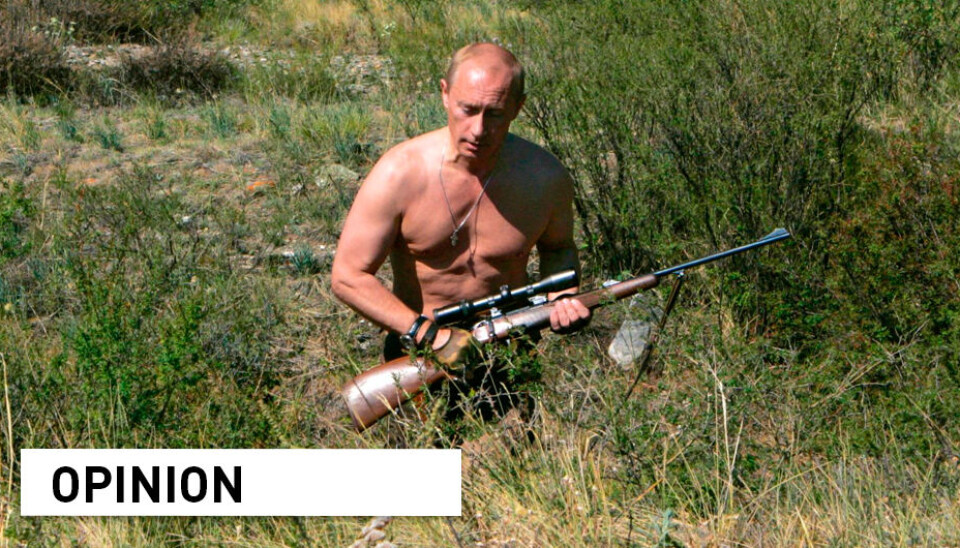Opinion:

Are Russians more macho?
OPINION: Is it Russian propaganda alone that provides the basis for support for the war in Ukraine, or is there a need for dominance in the Russian people's soul?
In a packed stadium, Putin recently addressed a patriotic crowd waving Russian flags. The occasion was to celebrate the annexation of Crimea in 2014 and show the great support for the 'military operation' in Ukraine.
While many Russians support the war, it is condemned by the West and many other countries.
Do Russians love power and dominance more than others, and can this explain their support for Putin?
Ukraine divided between two civilizations
Let's recapitulate a little. When the Berlin Wall and the Iron Curtain fell in 1989, we no longer had a Cold War and two superpowers vying for world domination. The trend towards a liberal market economy had come to an end, Francis Fukuyama claimed. McDonalds and capitalism were given free rein, including in Eastern Europe, and globalization seemed unstoppable.
Putin came to power in 2000 and his popularity grew in tandem with the reconstruction of Russia as a great power. The historian Samuel P. Hutchinson describes the new reality as a collision of civilizations. He mentions seven. Two of these are the West and the Russian Orthodox civilization to which Russia belongs.
Ukraine is divided in two, in between these civilizations. Kyiv and the western part are Western facing and eastern Ukraine belongs to the Russian Orthodox civilization.
Preschoolers in uniforms
Håvard Bækken at the Norwegian Armed Forces College points out the general, increased emphasis on Russia's militaristic history, also in the school system. Preschoolers are included in public parades, equipped with weapons and uniform-like equipment.
He says this may be based on the need to highlight Russian values and a perception of a threat from the outside and from globalization. The value of the Russian military is two-sided, it should be able to defend the country while contributing to social cohesion and the building up of national identity.
Of course, it would be completely wrong to say that a culturally predicated aggression is the basis for an invasion of a brotherly people. Some characteristics may nevertheless show us differences between different cultures.
Schwarzenegger condemned the war
The Dutch cultural scientist Geert Hofstede has gained great influence for his categorizations of cultural dimensions. He says, for example, that Russians have a greater 'power distance' than many other countries in the West. We all noticed Putin's long table and arrival in long corridors and large halls.
Ukraine's President Zelensky, on the other hand, films himself out in the streets of Kyiv speaking to the people in green t-shirts. In Norway, an image of the King taking the tram has become iconic as a symbol of this short power distance.
Film hero Arnold Schwarzenegger can illustrate another of Hofstede's cultural dimensions, namely 'masculinity' set against 'femininity'. Schwarzenegger recently condemned the war on twitter. He is hugely popular in Russia, and one of the few that Putin himself follows. Schwarzenegger is the epitome of the macho man who loves to wield power.
Feminine values
According to Hofstede, a 'masculine' society places emphasis on strength and power, while a 'feminine' society places more emphasis on soft values. Norwegian values such as humane prison conditions, unarmed police officers and a ban on the death penalty can be examples of such 'feminine' values.
In handball we have seen the Norwegian national team coach Marit Breivik taking the players on strategy advice ahead of matches. A stark contrast has been Russian handball coach Yevgeny Trefilov yelling and slamming his players when they make mistakes.
Putin seems to have marked his strength with other heads of state. He sent a large dog into the room during German Chancellor Angela Merkel's state visit to Russia despite knowing that she was afraid of dogs.
- RELATED: Putin may fall
Russians are increasingly proud
From a political chaos in the 1990s, with a virtually collapsed military system, Putin has reversed the development in Russia. The state and military are now moving more in step and building up national identity with an emphasis on religion, sport and patriotism. Russians are now increasingly pounding their chests and are proud to be Russians, which they rather tried to hide only a few years ago.
The danger with such cultural dimensions is that we create stereotypes. Stereotypes are simplifications, but we create them because we seek simple categories to put our knowledge into.
In today's globalized world, we know that all societies are diverse and complex. We must therefore put emphasis on treating each other as individuals and not draw hasty conclusions based on nationality, ethnicity, skin color, gender, orientation, or other characteristics.
And most importantly: ordinary Russians should not be held accountable for Putin's actions. However, cultural research shows us that there are cultural differences, and by understanding them we can improve communication between people.
Share your science or have an opinion in the Researchers' zone
The ScienceNorway Researchers' zone consists of opinions, blogs and popular science pieces written by researchers and scientists from or based in Norway. Want to contribute? Send us an email!



























